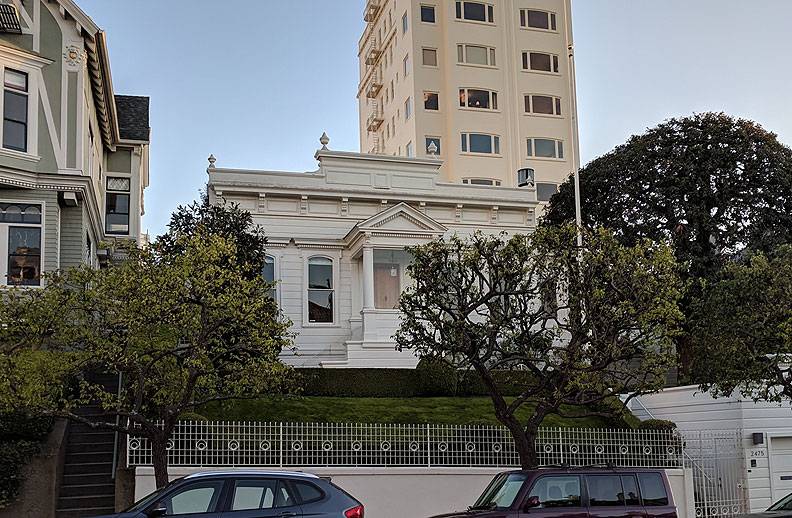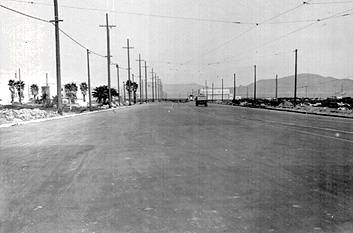AND THEY CALLED IT "COW HOLLOW": Difference between revisions
(PC) |
(added photo) |
||
| Line 1: | Line 1: | ||
'''<font face = Papyrus> <font color = maroon> <font size = 4>Primary Source</font></font> </font>''' | '''<font face = Papyrus> <font color = maroon> <font size = 4>Primary Source</font></font> </font>''' | ||
[[Image: | [[Image:Leale-House-2475-pacific-Ave-for-25-acre-dairy-farm 20190217 172446.jpg]] | ||
'''When built in approximately 1853, the house anchored a 25-acre dairy farm.''' | |||
'' | ''Photo: Chris Carlsson, 2019'' | ||
Seventy-nine-year-old Bill Hatman said, "To begin with Cow Hollow, and how it got its name. . ." He would know what he was talking about. He was born in 1867 in a house a hundred feet from the one in which we were sitting. His parents, Mr. and Mrs. George William Hatman, came around the Horn, arriving here in 1853. When they reached here, they had with them a baby girl, born aboard ship at Valparaiso, and his mother used to recall that bewhiskered men would approach her in the streets of the city and ask, "Madam, can I hold the baby for a minute?" | Seventy-nine-year-old Bill Hatman said, "To begin with Cow Hollow, and how it got its name. . ." He would know what he was talking about. He was born in 1867 in a house a hundred feet from the one in which we were sitting. His parents, Mr. and Mrs. George William Hatman, came around the Horn, arriving here in 1853. When they reached here, they had with them a baby girl, born aboard ship at Valparaiso, and his mother used to recall that bewhiskered men would approach her in the streets of the city and ask, "Madam, can I hold the baby for a minute?" | ||
| Line 26: | Line 27: | ||
--Robert O'Brien, ''San Francisco Chronicle, ''January 1947 | --Robert O'Brien, ''San Francisco Chronicle, ''January 1947 | ||
[[Image:marina$fillmore-st-1920.jpg]] | |||
'''Fillmore at Chestnut, about 1920, after the Panama-Pacific Exposition had been torn down.''' | |||
''Photo: San Francisco History Center, SF Public Library'' | |||
Revision as of 21:33, 26 February 2019
Primary Source
When built in approximately 1853, the house anchored a 25-acre dairy farm.
Photo: Chris Carlsson, 2019
Seventy-nine-year-old Bill Hatman said, "To begin with Cow Hollow, and how it got its name. . ." He would know what he was talking about. He was born in 1867 in a house a hundred feet from the one in which we were sitting. His parents, Mr. and Mrs. George William Hatman, came around the Horn, arriving here in 1853. When they reached here, they had with them a baby girl, born aboard ship at Valparaiso, and his mother used to recall that bewhiskered men would approach her in the streets of the city and ask, "Madam, can I hold the baby for a minute?"
"Women were scarce in those days, and babies were scarcer, " she would explain.
The first job his father had was driving a white mule in a brickyard, and for a week's wages he was given an octagon-shaped gold piece worth $50. One day, Mrs. Hatman asked him to bring home some potatoes. So expensive were the potatoes, he easily carried home all he could buy for $2.50--in his coat pocket.
This gave him an idea, and a little later he leased a tract of land near what is now the intersection of Gough and Green streets, and planted a truck garden. That would be up the hill a bit and south of Washerwoman's Lagoon.
It was in 1861 that Hatman bought a piece of land now corresponding to the block bounded by Union, Filbert, Franklin and Gough streets, for $500. There was good grazing land there, a few houses and nothing else. To the north were sand dunes stretching to Black Point and the bay. To the west were the rolling hills of the Presidio reservation.
There Hatman started a dairy ranch, and there, 79 years ago, his son was born. This dairy was one of the first, and before many years had passed, by the early seventies, there were at least 30 dairies between Van Ness avenue and the Presidio. Hatman's dairy, with 60 cows, was the average size, although there were some that had as many as 200. Milk in those days cost you 20 to 25 cents a gallon wholesale. Delivered to your door, the retail price of a quart daily for a month would have been from $2.50 to $3.
Hatman could remember the names of some of the dairy operators--John McGovern, Peter Matthews, Tom Barellias, the widow Roache, Mike Linehan and his brother, John. The Haleys, Jim, Dan and Will, who later became Borden's West Coast manager. Frank Matthias, whose dairy was about where Steiner and Francisco meet now, and E. K. Knight, at Lombard and Steiner, and the Gamma brothers and Frank Emhoff, whose dairies were hard by the distillery located at Pierce and Lombard.
So, in their direct way, San Franciscans stopped calling it Spring Valley, and began to refer to it as Cow Hollow, and when you hear them talk about Cow Hollow, they're talking about the Marina and that part of the Western addition bounded by Pacific avenue on the south, Larkin street on the east, the bay on the north, and the Presidio on the west.
It's a name that stuck. It persisted long after the '80s, when the Board of Health moved the dairies to other sections of the city, and once in a while, you still hear it. It's the mark of a man who's an old timer, and proud of it.
--Robert O'Brien, San Francisco Chronicle, January 1947
Fillmore at Chestnut, about 1920, after the Panama-Pacific Exposition had been torn down.
Photo: San Francisco History Center, SF Public Library


